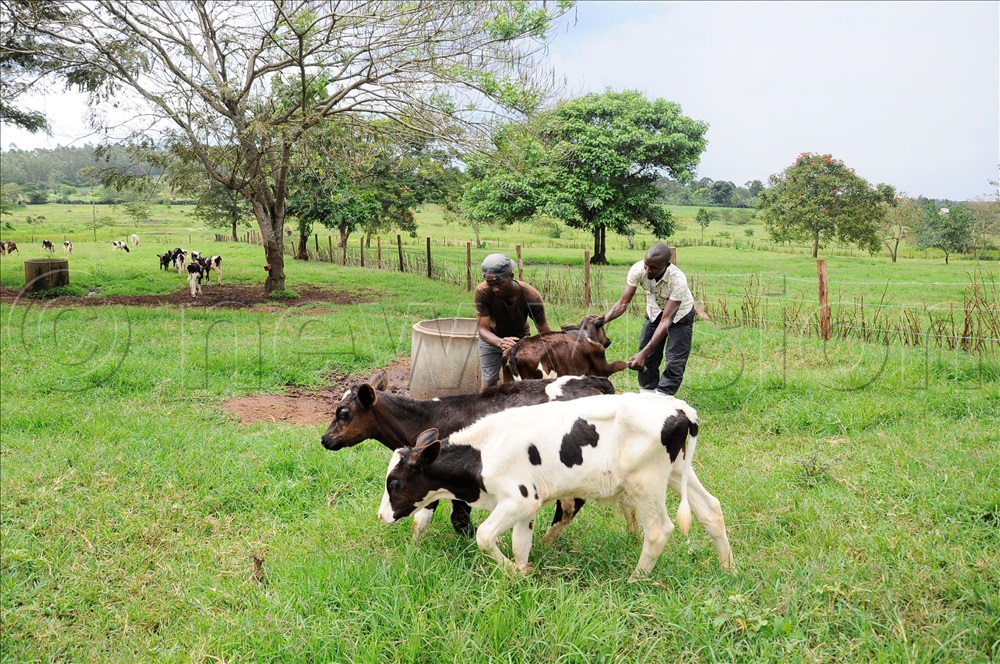By Umar Nsubuga
The success of any dairy farm depends largely on the health and vitality of its calves. These young animals represent the future of the herd, and how they are cared for in their early months directly impacts their productivity as adults.
By prioritizing proper feeding, hygiene, disease prevention, and overall calf management, farmers can ensure that their calves grow into strong, high-producing cows.
Expert dairy farmers like Ruta Ngambwa understand that raising healthy calves is not just a necessity it’s the key to building a sustainable and prosperous dairy operation.
One of Ngambwa’s first and most important tips is the timely feeding of colostrum, the first milk produced by the cow after giving birth. Colostrum is rich in antibodies, vitamins, and nutrients essential for the calf’s immunity and early growth.
“A calf must receive colostrum within the first 1-2 hours of birth,” Ngambwa explains.
“That’s when their digestive system is most capable of absorbing the antibodies they need to fight off diseases.”
He emphasises that the quality and quantity of colostrum matter.
Ngambwa advises that calves should be fed at least 2 litres of colostrum within the first feeding and continue for the next 2-3 days.
Housing and hygiene
Ngambwa stresses the importance of keeping calves in a clean, dry, and well-ventilated environment. Proper housing reduces the risk of infections and keeps the calves comfortable.
“Calves are vulnerable, especially in the first few weeks of life. Their bedding needs to be dry at all times, and their pens should be cleaned regularly to prevent bacterial infections,” he advises.

Ngambwa uses straw and sawdust as bedding for his calves, and he makes sure to change it frequently.
He also ensures that their housing is shaded and well-ventilated to prevent respiratory problems, which can easily affect young calves.
Balanced nutrition
Colostrum is vital in the first few days, Ngambwa insists that proper nutrition beyond that period is the backbone of raising healthy calves.
He starts introducing milk replacers or fresh milk feedings after the initial colostrum stage and carefully monitors the calves’ intake to ensure they are getting the right amount of nutrients.
“Calves need consistent, high-quality feed. You must give them milk at regular intervals, ensuring they drink enough to grow strong but not overfeed them,” she shares.
Ngambwa gradually introduces calf starter feed by the second week, a specially formulated blend of grains and nutrients to support growth.
He adds that calves should always have access to clean water, as dehydration can slow their development and weaken their immune systems.
Disease prevention
Disease prevention is a top priority for Ngambwa, and he recommends a strict vaccination and deworming schedule to keep calves healthy.
According to him, regular health checks are key to spotting any early signs of illness.
“Prevention is always better than cure. Make sure your calves are dewormed regularly, and don’t skip vaccinations. Calves are prone to diseases like pneumonia and scours, and you need to be vigilant,” Ngambwa advises.
He also highlights the importance of observing the calves for signs of illness, such as lethargy, loss of appetite, or abnormal stool, and contacting a vet immediately if any issues arise.
Socialisation and exercise
Socialisation is another critical component of raising healthy calves, according to Ngambwa.
He believes that calves should have the opportunity to interact with each other and engage in regular exercise.
“Allowing calves to socialise in small groups helps them develop better and reduces stress. It also promotes better eating habits,” he explains.
Ngambwa lets his calves out to graze in a safe, enclosed area where they can run around and get accustomed to the herd environment. Exercise not only strengthens their muscles but also boosts their immunity, he notes.





